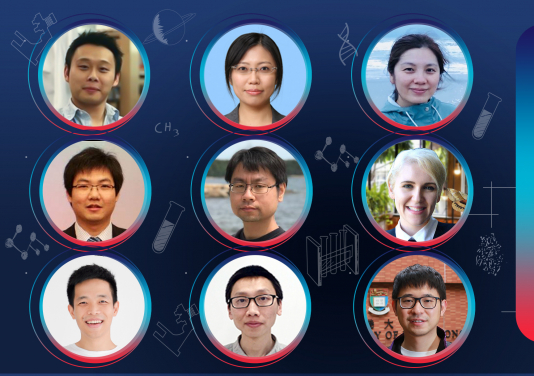Media
Nine HKU young scientists awarded China's Excellent Young Scientists Fund 2021
22 Aug 2021
Young researchers at the University of Hong Kong have achieved outstanding results in the Excellent Young Scientists Fund (Hong Kong and Macau) for 2021.
Nine HKU young scientists have been awarded the prestigious fund under the National Natural Science Foundation of China, an organisation managed by the Ministry of Science and Technology (MOST).
This has been the third consecutive year for HKU to be awarded the highest number of projects among its peer institutions, after the fund was extended to Hong Kong and Macau for applications by eight designated universities since 2019.
The Excellent Young Scientists Fund is granted annually to support young male scientists under the age of 38 and young female scientists under the age of 40 who have attained outstanding achievements in research, to further expand in areas of their own choice.
The Fund is highly competitive, with only 25 projects in total funded across Hong Kong and Macau this year. Each project will receive a funding of RMB1.6 million over a maximum period of three years, in the form of cross-border remittance to directly support the researchers' work in Hong Kong or Macau.
Nine HKU young scientists:
LKS Faculty of Medicine
Dr Chu Hin
Assistant Professor, Department of Microbiology
Faculty of Science
Dr Jenny Lee Hiu Ching
Associate Professor, Department of Physics
Dr Dai Lixin
Assistant Professor, Department of Physics
Dr Liu Junzhi
Assistant Professor, Department of Chemistry
Dr Zheng Chaogu
Assistant Professor, School of Biological Sciences
Dr Louise Amy Ashton
Assistant Professor, School of Biological Sciences
Faculty of Engineering
Dr Huang Zhiyi
Associate Professor, Department of Computer Science
Dr Wang Zhongrui
Assistant Professor, Department of Electrical and Electronic Engineering
Dr Li Can
Assistant Professor, Department of Electrical and Electronic Engineering
The award-winning projects:
Dr Chu Hin
Assistant Professor, Department of Microbiology, LKS Faculty of Medicine
Project Title: Coronaviruses
Dr Chu focuses on coronavirus research and has made significant contributions on multiple aspects of highly pathogenic coronaviruses. This project aims to further dissect the interaction of SARS-CoV-2 with transmembrane protease and cell surface host factors. Knowledge obtained from the proposed study will contribute to our understanding on the current COVID-19 pandemic and provide novel insights as well as therapeutic targets against the transmission and replication of SARS-CoV-2.
Dr Jenny Lee Hiu Ching
Associate Professor, Department of Physics, Faculty of Science
Project Title: Radioactive Isotope Physics
Dr Lee is a nuclear physics experimentalist aiming to investigate the novel structure of extremely exotic nuclei with radioactive isotope beams and construct new-generation detection array for high-precision measurements. This project employs their state-of-the-art arrays to explore A) isospin symmetry breaking via precise β-decay spectroscopy of 23Si at HIRFL of Institute of Modern Physics (China), B) new magicity in 100Sn via in-beam gamma spectroscopy of 100Sn at RIKEN (Japan), guiding towards comprehensive and even beyond traditional understanding of nuclear forces.
Dr Dai Lixin
Assistant Professor, Department of Physics, Faculty of Science
Project Title: Astrophysics & Astronomy
Dr Dai has obtained significant progress towards the understanding of tidal disruption event (TDE) physics. Based on the established foundational work, she will continue to push the development of the TDE field. She will also link her work to studying other black hole accreting astronomical systems and the co-evolution of massive black holes and galaxies.
Dr Liu Junzhi
Assistant Professor, Department of Chemistry, Faculty of Science
Project Title: Atomically Precise Synthesis of Non-benzenoid Nanographenes
Based on the molecular design and synthetic chemistry, Dr Liu has been committed to the atomically precise synthesis of nanographenes (polycyclic aromatic hydrocarbons, abbreviated as PAHs) and the study of their physical and chemical properties.
Dr Zheng Chaogu
Assistant Professor, School of Biological Sciences, Faculty of Science
Project Title: Developmental Neurobiology
In this project, Dr Zheng plans to continue using the touch circuit as a model to study the molecular mechanisms of synaptogenesis, the decision between chemical and electrical synapses, the “innexin code” underlying the specificity of gap junctions, and the process of circuit remodeling during development. Expected results from this project can have profound impacts on our understanding of how neuronal networks are established and how the nervous system develops.
Dr Louise Amy Ashton
Assistant Professor, School of Biological Sciences, Faculty of Science
Project Title: Understanding insect responses to environmental change in rainforest
This project will help address the urgent global issue of insect declines, as well as broaden our understanding of how ecosystems and their functions are changing under climate change.
Dr Huang Zhiyi
Associate Professor, Department of Computer Science, Faculty of Engineering
Project Title: Optimization Under Uncertainty
Dr Huang works broadly in Theoretical Computer Science, with a focus on Optimization Under Uncertainty, including problems in Online Algorithm and Algorithmic Game Theory. This project aims to resolve three important open problems about the sample complexity of mechanism design.
Dr Wang Zhongrui
Assistant Professor, Department of Electrical and Electronic Engineering, Faculty of Engineering
Project Title: Research on novel memristors and brain-inspired computing
The research of Dr Wang concentrates on memristor-based brain-inspired computing (including both neuromorphic computing and machine learning). He proposes to devise a memristor-based spiking neural network via hardware-software co-design for electroencephalography processing.
Dr Li Can
Assistant Professor, Department of Electrical and Electronic Engineering, Faculty of Engineering
Project Title: Neuromorphic Computing Chips with Memristors
In this project, Dr Li plans to tackle the remaining bottleneck issue in the proposal neuromorphic system to further improve energy efficiency and enable novel intelligence. The problems to tackle include the software-hardware optimization, full analog-event driven system, and sensor-integrated heterogenous neuromorphic computing system. His research team will demonstrate its application in wearable electronics, quantum sensing, etc.
For media enquiries and interviews with the scientists, please contact HKU Communications and Public Affairs Office: Ms Melanie Wan, Senior Manager (Media), Tel: 2859 2600 / Email: melwkwan@hku.hk.

